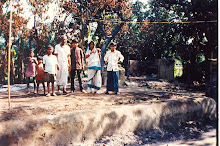Reading
from “Mukti: Free to be Born Again – Partitions of Indian Subcontinent,
Islamism, Hinduism, Leftism and Liberation of the Faithful” by author Dr.
Sachi Dastidar at ISPaD: Partition Center on Sunday, March 6th, 2016
Shuvo
G. Dastidar, ISPaD Project Coordinator
Reading from Dr. Sachi Dastidar’s nonfiction
book “Mukti” held today was a monumental occasion for history. The event was
held in the conference meeting area of The Indian Subcontinent Partition
Documentation (ISPaD) Project. Those who attended were impressed by some of
stories told. Stories, Indian and
Bengali, which are actually narratives, depict a society that has sidelined all
inhibitions towards any pain, fear, war, and hatred directed at one’s neighbor
- literally. Prejudice and impartiality runs side-by-side, is a serious
contradiction of the society. Too many parts of society have also moved to eliminate
choices as the society, mostly through harmful acts and violations of human
rights, moves to become a religious region by force. Dr. Dastidar succinctly
explains to readers the background and mobilizing factors that propelled his
authorship forward and completion of a book/historical piece in the Preface of
the book: “Mukti is a product of
love and pain of at least three decades. It is a byproduct of over three
decades of field work, social work and travel in the 1947 Partition-affected
Bengal –Bangladesh (formerly East Pakistan), West Bengal State of India – as
well in the neighboring states…….During my travel in Muslim-majority Bangladesh
I have come across the term ‘mukti’ from many, especially indigenous
pre-Islamic Hindu, and lately Buddhist, families as they pray for liberation
from their suffering….The
book is directed towards Western readers many of whom may have heard of India,
yet very little is known about post-partition Muslim-majority Bangladesh and
Hindu-majority West Bengal, the effects of Indian Partition on the people of
the Bengali-speaking region, the former mixed Hindu-Muslim Bengal Province of
Colonial British India……Yet the privileged-caste Hindu-refugee elites quickly
rose to power in two Hindu Bengali-majority states in India: West Bengal and
Tripura. They would champion liberal, left and Marxist ideologies but refused
to show solidarity with the oppressed, mostly belonging to Hindu oppressed
castes [whom they left
behind]… Seeds of Mukti
was first sown in early 1990s when many of my friends and associates asked for
translation of my Ai Bangla, Oi Bangla (This Bengal, That Bengal.)…..The Bengal
of British India was known to be a relatively-tolerant mixed Hindu-Muslim
society where both Hindu and Muslim nationalism played significant role. In a
surprise twist of history after Partition of Bengal and India in 1947 both
Bengals took stride towards intolerant politics, one…Islamism, the
other….Leftism, led by Bangladeshi (East Pakistani) Muslims and Bangladeshi
(East Pakistani) Hindu, albeit refugee. The book delves into that ethos and
contradiction, although politically incorrect and, at times, impolite…..I have
no power to protect individuals and families who have shared their deepest
feelings to my family. I have no power to protect their villages either. As a
result I have not used the real names of individuals, villages and
neighborhoods….”
Dr. Dilip Nath introducing Mother Language Day
and Sachi Dastidar
The painstaking
intellectual, research (both with documents and with people), unbelievable
amount of time, and most certainly emotional process that coalesced to complete
this piece of work is something which truly does “blow my mind”. Mukti is a 700
page book that took over 18 years to write
The day of the reading
started out a bit slow, as was to be expected of most Bengali/Indian events –
especially one in which there was a cricket match of Bangladesh vs. India.
Little by little the room filled up with individuals. Dastidar was introduced
by Dr. Dilip Nath and then by this writer introduced the Partition Project. Dr.
Nath, in line with the Mother Language Day asked all for a moment of silence
for the Language Martyrs who were killed on February 21, 1952 to defend their
mother language.
Dr. Caroline Sawyer and Ms. Anjali Sharma
during Q&A
Following the
introduction was the book reading portion where Dastidar selected a few
passages he thought would be especially relevant to the individuals present. Mrs.
Shubra Goswami graced the crowd with her beautiful voice by singing several
songs. Mrs. Goswami sang traditional Bengali songs and at the request of the
audience sang a song of Rabindranath Tagore. A Q&A followed the reading. After
the formal event had finished all individuals introduced themselves and their
special interests. AND finally all partook in the wonderful Indian food
available in a wide variety in large amounts, as well as Caribbean snacks from
Brooklyn provided by Mr. Jay Hyman. Most who attended also purchased one or
more copies of “Mukti” and made sure that it was signed. It was a day that will
be seen as a date to remember since it was the date “Mukti” was made publicly
available to us and the first speaking engagement Dr. Dastidar gave for it. (Few
more book readings are coming in Ozone Park, New Jersey, Albany and Long
Island.) Thank you all for having supported research about the Indian
Subcontinent.
During
Question & Answer
A Few of the Book Presentations at:
- Harimandir Temple, South Richmond Hill, Queens, New York City; March 26, 2016
- State University of New York, Old Westbury, Long Island; April 19, 2016
- Albany, NY organized by State University of New York Distinguished Professor Dr. Ram Chugh; May 31, 2016






No comments:
Post a Comment